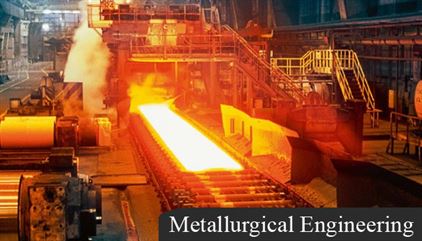
Metallurgical Engineering is a broad field of engineering that deals with all sorts of metal-related areas. It is branch of engineering that deals with a study of science of metals and their properties, including separating metals from their ores, formation of alloys and heating metals to change their physical characteristics.
Apart from basic principles of engineering, the metallurgical engineering course profile equip students with knowledge of designing, manufacturing and production of various metal products that ranges from cars and bikes to buildings and planes. Some major areas of studies include Hydrometallurgy, Mechanical metallurgy, and Heat treatment of steels, Welding metallurgy and many more
Metallurgical engineering can be broadly divided into three categories –

Physical metallurgy: Deals with problem solving: you’ll develop the sorts of metallic alloys needed for different types of manufacturing and construction.
Extractive metallurgy: Involves extracting metal from ore.
Mineral processing: Involves separating commercially valuable minerals from their ores.
Eligibility Criteria
Under Graduate:
For admission in a bachelor’s degree, the candidate must have passed the higher secondary school certificate (10+2) examination with science subject such as Physics, math’s and chemistry. For IITs, It is mandatory to qualify in the Joint Entrance Examinations (J.E.E). The duration for this course is 4 years.
Post Graduate:
The eligibility criteria for pursuing a master’s degree are holding a bachelor’s degree in (B.E/B.Tech) or any other equivalent branches of engineering. The duration for this course is 2 years.
Core Subjects Of Metallurgical engineering
- Chemistry
- Engineering Mechanics
- Mathematics
- Physics
- Chemistry lab
- Electronics Engineering
- Electrical Engineering
- Fuels, Furnaces and Refractories
- Material Science
- Engineering Graphics
- Elements of Physical Metallurgy
- Metallurgical Thermodynamics
- Transport Phenomena
- Mineral Beneficiation
- Machine Elements and Machining
- Probability and Statistics
- Phase Transformation and Mechanical Metallurgy
- Mechanical Behaviour and Testing of Materials
- Production of Iron
- Non Ferrous Extraction Metallurgy
- Corrosion and Surface Engineering
Some job profiles for metallurgical engineer are:
- Scientist
- Professor
- Researcher
- Metallurgist
- Welding Engineer
- Plant Equipment Engineer
- Ballistics Engineer
- Quality Planning Engineer
- Senior Process Engineer
- Supplier Development Engineer
Top colleges for metallurgical engineering in India
- Indian Institute of Technology Bombay (IIT Bombay)
- Indian Institute of Technology Madras (IIT Madras)
- National Institute of Technology (Durgapur)
- National Institute of Technology – Karnataka
- Indian Institute of Technology Kharagpur (IIT KGP)
- Indian Institute of Technology Roorkee (IIT Roorkee)
- National Institute of Technology, Tiruchirappalli
- Jadavpur University (Faculty of Engineering & Technology)
- Indian Institute of Technology, Kanpur (IIT Kanpur)
Job Prospects for Metallurgical Engineers
Metallurgists are employed in foundries, heat treatment shops, rolling mills, etc. industries. They are also employed in research laboratories, industries and plants extracting and processing metals like iron and steel, nickel, tin, copper, zinc, aluminium and brass etc. Tata Iron and Steel Company at Jamshedpur and steel plants of Durgapur, Bhillai, Rourkela and Bokaro also employ them.
Job duties of metallurgical engineers
- Conduct research and development
- Develop processing plants
- Supervise production processes
- Assure the quality of metal products
- Sell and service metal products
- Write for technical magazines and trade associations
Top Recruiters in metallurgical engineering:
Larsons Group, New Bharat Refractories Ltd, The Metal Powder Company Ltd, Hindustan Aeronautics Ltd, NALCO, Utkal Mineral, Tata Steel, HCL, Jindal Steel Steel Authority of India (SAIL)
This article has compiled information from various sources to impart knowledge regarding job prospects and scope of metallurgical engineering as career option with a hope to help our subscribers in choosing their desired field of metallurgical engineering as a profession.